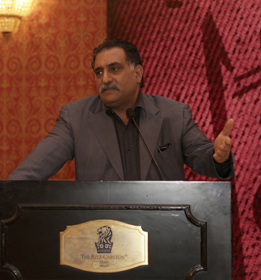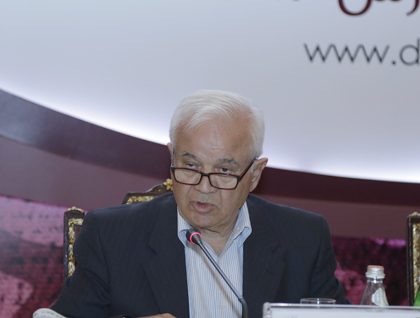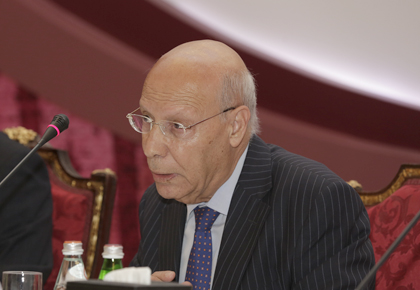
The second ACRPS Conference on the Social Sciences and Humanities began on Saturday, March 30, 2013 in Doha. ACRPS General Director Dr. Azmi Bishara began the proceedings with a welcoming note in which he stressed the importance of continuity between this year and the previous year's event. He highlighted the importance of the meeting not only as a chance for detailed discussions of research findings and scholarship, but also as an opportunity for Arab academicians to connect. Dr. Bishara also stressed that this event would be held annually.
Following Dr. Bishara's welcome, Dr. Ahmad Baalbaki, from Lebanon, presented the first general lecture, titled "On Liberalism in Lebanon: Promoting the Integration of Individuals within the Confines of their Confessional Group," relating to one of the conference's main themes-social integration in the Arab Homeland. He spoke of a social cohesion within liberal societies. The first is a cohesion born out of a social integration that is imposed on migrants in continental European countries, while the second is seen as social assimilation in Anglo-Saxon countries, where the immigrants' social and cultural differences are tolerated. Baalbaki observes that many Arab migrants often become more fundamentalist, while living in liberal, Western societies. He also discussed Lebanon's domestic situation, noting that half of the country's university graduates were forced to migrate-making the case that it was the failure of trans-confessional social integration which led to the breakdown of the role of labor unions and professional syndicates.
 Lebanon sects have been able to entrench themselves within their own institutions, pointing out that one-third of the country's school students are registered in parochial schools. According to Baalbaki's concluding remarks, the barriers to social integration in Lebanese society led to the reduced participation in political life, which has detrimentally affected labor rights.
Lebanon sects have been able to entrench themselves within their own institutions, pointing out that one-third of the country's school students are registered in parochial schools. According to Baalbaki's concluding remarks, the barriers to social integration in Lebanese society led to the reduced participation in political life, which has detrimentally affected labor rights.
The second lecture in the opening session was presented by Kuwait University's Dr. Fahmi Gedaan, who addressed the present-day Arab definition of justice-another major conference theme. Dr. Gedaan's lecture was titled "Justice within an Arab Deontology," which included the etymology of the Arabic word of justice, focusing on contemporary writers use of the words adl and adala interchangeably to mean "justice," though most historical Arabic literature distinguish between the two. Accordingly, the word adl, traditionally carried more of a connotation of right and virtue as opposed to procedural justice. It was a word that had an important place in the long-standing traditions in the Islamic world. The problem, Gedaan feels, is that "unbridled" liberalism has ignored such variations on justice, but that attention to it by Arab scholars is necessary.

According to Gedaan, the theoretical conceptions of justice produced by various schools of thought are not exclusive to the West, but are part of a common human tradition. He did, however, suggest that it is quite simple to attempt projecting Western theories onto an Arab reality.
He maintained that utilitarianism, as a philosophical approach born in the West, holds promise in how it could be applied in Arab countries, though he acknowledges the need to distinguish between a utilitarianism based on the public good, and one that leads to excessive individualism and hedonism. In closing, Gedaan suggested that a universalist form of democracy could provide the key to what is a "just" or "virtuous" society, provided that there is justice, the value of work, and holistic economic development.